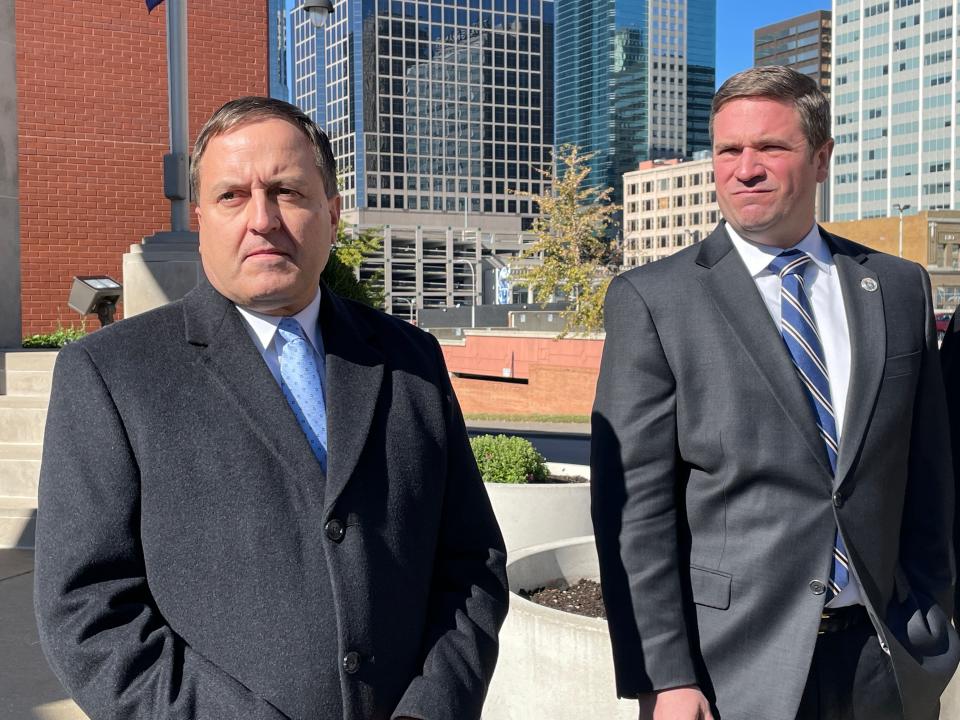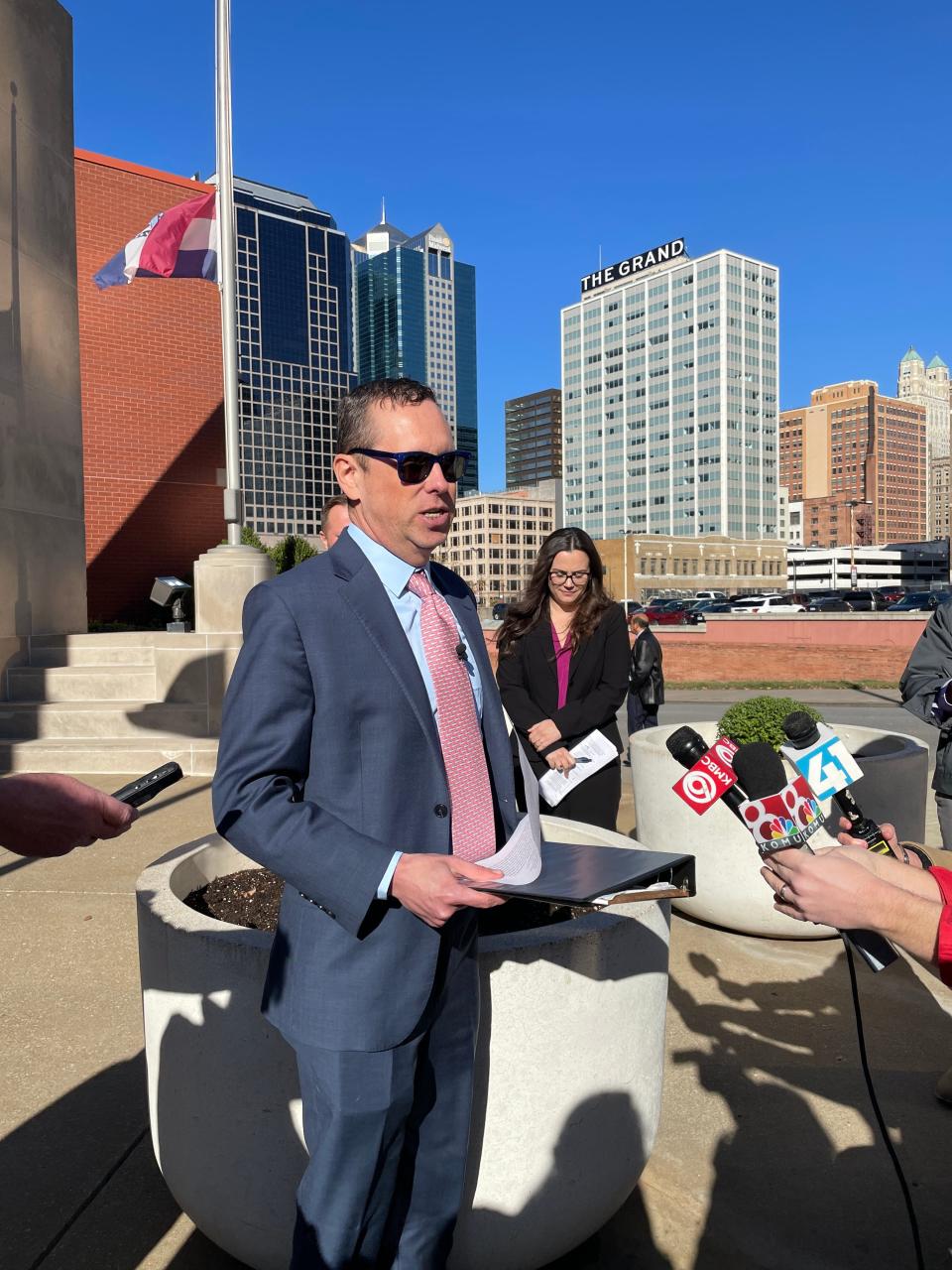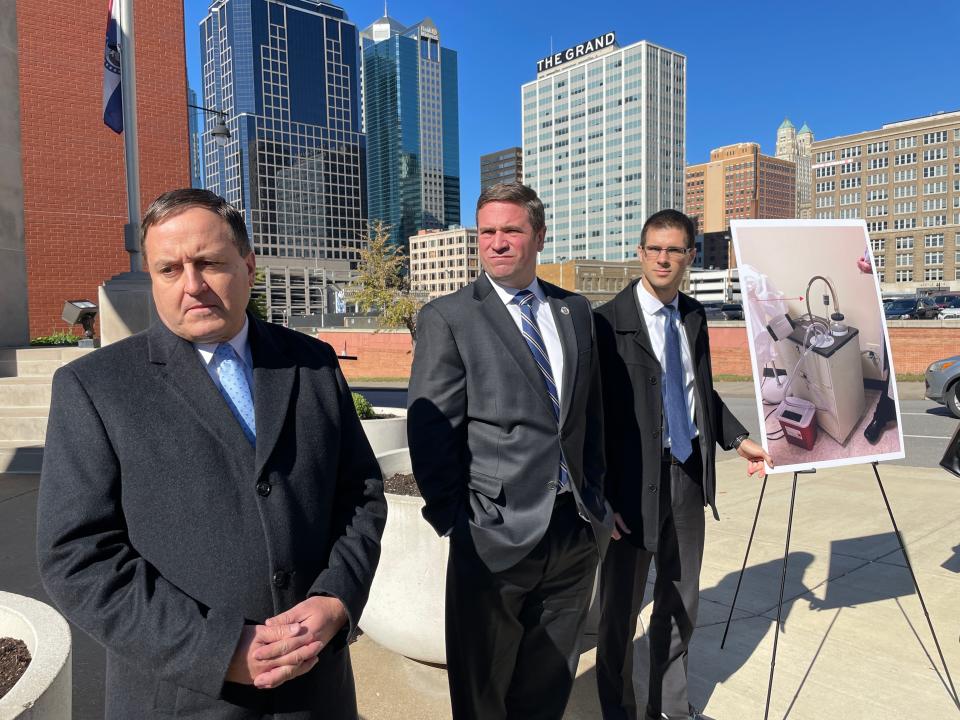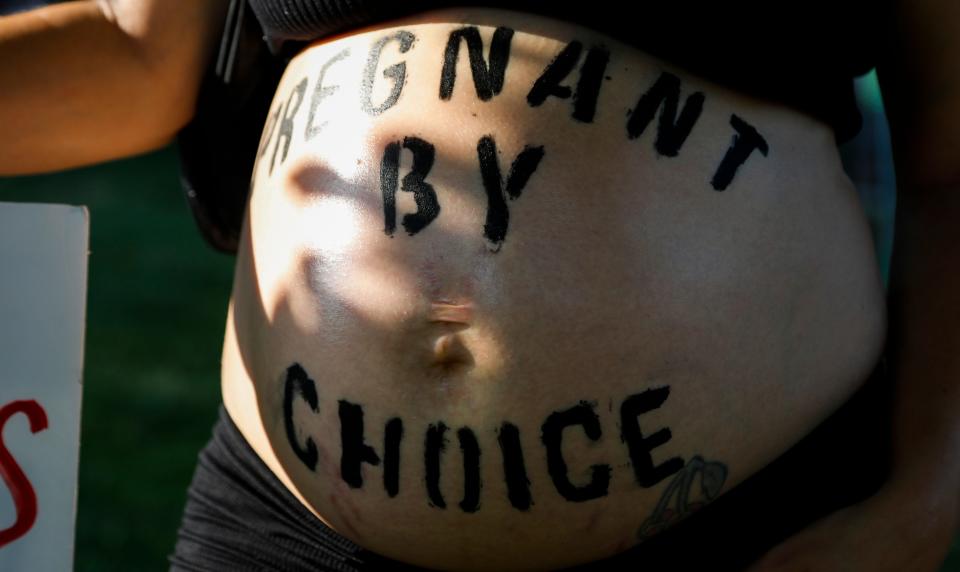Missouri appeals court hears arguments in abortion-rights cases. New legal challenges loom
- Oops!Something went wrong.Please try again later.
- Oops!Something went wrong.Please try again later.
Once again, abortion-rights advocates and opposers take to the courtroom, seeking to settle a legal battle over abortion-rights petitions.
Appellants argued that Secretary of State Jay Ashcroft’s ballot language sufficiently summarized the intentions of six of the 11 ballot initiatives seeking to reinstate abortion rights in Missouri.
They seek to overturn the Sept. 25 ruling by Cole County Circuit Court Judge Jon Beetem, who found that Ashcroft’s language was problematic.
Ashcroft’s language asked voters if they wanted to “allow for dangerous, unregulated, and unrestricted abortions, from conception to live birth, without requiring a medical license or potentially being subject to medical malpractice.”
“My office's job with regard to initiative petitions is to tell the truth,” Ashcroft said. “If there is inflammatory language, it is because the initiative petition requires us. We do not just make up language out of whole cloth.”
Beetem rewrote Ashcroft’s language to ask voters if they want to establish the “right to make decisions about reproductive health care, including abortion and contraception,” which would abolish the statewide ban on abortion.

Ashcroft attended Monday’s hearing at the Western District Court of Appeals, as did Missouri Attorney General Andrew Bailey, although neither participated in oral arguments.
“Under these petitions, the state would have no role to play to protect women and children,” Bailey said, in a press conference following the hearing. “I'm proud to be in this fight to protect women and children's safety in the state of Missouri to fight back against the radical abortion activists.”
Ashcroft is running for governor in 2024, and he has secured the single endorsement of Missouri Right to Life. Bailey seeks reelection as state attorney general in 2024.
Arguing for Ashcroft was Missouri Solicitor General Joshua Divine, who said that the initiative petitions in question “would enable abortion just because the father is Black, or just because the baby is a girl.”
Divine argued that the gist of these petitions was equivalent to having no regulation of abortion, allowing for unsanitary medical procedures, meaning that Ashcroft’s ballot summary statement was accurate as he had written it.
“Under these petitions, every abortion becomes a back alley abortion,” Divine said.
Appeals Court Judge Edward Ardini pointed out that Ashcroft’s language indicating this would allow for live-birth abortions could be misleading, as federal law prohibits this and supersedes any state statutes.
“I think the Missouri voters are smart enough to know that nullifying the Missouri law is different from nullifying a federal law,” Divine said.

Tony Rothert represented the ACLU of Missouri, which sued the Secretary of State on behalf of Anna Fitz-James, the physician who filed 11 initiative petitions seeking to restore the right to abortion. He argued that Ashcroft’s motives in writing the language were personal and political.
“The Secretary of State concocted a summary statement that's filled with bombastic, argumentative, hyper realistic language, that mistakes the purpose of the initiatives,” Rothert said at a press conference following the hearing. “Voters are entitled to a corrected summary statement.”
Appeals Court Judge Thomas Chapman drew attention to the open wording of the petitions that allowed for abortions with a compelling interest for the health of the mother into the third trimester. Chapman noticed this was lacking from the circuit court’s new language.
“While the term live birth may be something that folks would argue is political or charged, the idea that this would go through almost the entire term of gestation is something that would be a sea change,” Chapman said. “It's not noted in anything in the circuit court's explanation.”
The court gave no ruling on this or the second case heard involving a challenge to the fiscal note summary, but a speedy decision is expected. Any verdict will almost certainly be appealed to the Missouri Supreme Court.
More: Politician or the people's lawyer? How the role of Missouri Attorney General has evolved
Challenging the estimated cost of reinstating abortion
When the fiscal notes were first filed, a dispute over the fiscal note began the arduous legal battle that continues to stretch on, delaying the collection of signatures necessary to put a petition on the 2024 ballot.
The Missouri Supreme Court found that Attorney General Andrew Bailey had overstepped the authority of his office when he refused to certify state Auditor Scott Fitzpatrick’s fiscal note summary, which gave an estimate of the costs or savings to Missouri if access to abortion is reinstated.

However, after the fiscal note is finalized, any citizen can file a lawsuit disputing the content, which is exactly what two Republican lawmakers and an anti-abortion activist did.
Rep. Hannah Kelly, R-Mountain Grove, and Sen. Mary Elizabeth Coleman, R-Arnold, and Kathy Forck filed a lawsuit against state Auditor Scott Fitzpatrick and Secretary of State Jay Ashcroft in August, arguing the cost was too low and that the state could jeopardize its federal Medicaid funding.
Judge Beetem denied the challenge by the plaintiffs, finding that Auditor Fitzpatick’s cost estimates were accurate and Medicaid funding was not at risk. Additionally, the Department of Social Services, which manages the state’s Medicaid program, said it foresees no fiscal losses.
“Contrary to appellants' assertion, the auditors' process to exclude those submissions that indicated measures will result in loss of federal Medicaid dollars was not unfair,” said Robert Tillman, representing Fitzpatrick. “These submissions were in direct conflict with other submissions that indicated no such loss would occur.”
Mary Catherine Martin, an attorney for conservative law firm the Thomas More Society, represented the appellants in this case, arguing again that the cost to the state was understated.
She thinks that the sole projection of lost tax revenue of $51,000 from Greene County should be extrapolated statewide. However, Appeals Court Judge Alok Ahuja questioned that argument, highlighting the varying taxation rates across the state that differ from Greene County, which used its own tax rates to calculate the projected loss.
“The brief uses the word simple to describe the exercise of I'll call it universalizing or extrapolating the Greene County estimate,” Ahuja said. “But it strikes me, it's not that simple.”
Appeals Court Judge Karen Mitchell felt that the appellants wanted Auditor Fitzpatrick to go beyond simply collecting estimates of cost from various counties, cities and school districts, which is how the auditor gathers estimated costs for the fiscal note summary.
“It sounds to me like you're asking that the auditor go well beyond what information is provided to assess the analysis, and come up with a representation beyond that information,” Mitchell said.
Ahuja suggested that asking the auditor to extrapolate the cost estimated by Greene County to other areas could disparage the counties that replied that they projected no costs or savings when asked for an estimate from the auditor.
The ACLU of Missouri was named a respondent in this case and was represented by Jonathan Schmid, who argued that the Greene County estimate be entirely removed. However, Ahuja questioned the right of the ACLU to make that demand, as it did not originally challenge the fiscal note or file a cross appeal in the case.
More: Women working in the Springfield tech industry face disparities but love what they do
A new lawsuit to challenge additional six ballot initiatives
A second set of initiative petitions were filed by conservative supporter Jamie Corley through the Missouri Women and Family Research Fund, and drafted with the assistance of attorney Chuck Hatfield, who has a long history of litigating matters related to initiative petitions.
Filed by the Missouri Women and Family Research Fund, The petitions would allow for abortions in the case of incest, rape, fatal fetal abnormalities or risks to health or safety of a mother, with some allowing abortions up to 12 weeks of pregnancy.
Ashcroft’s office recently finished ballot summaries for the six new proposals, which would ask voters to “nullify Missouri laws protecting the right to life” and “allow abortions at any age without government interference from conception to live birth in the case of rape or sexual assault, incest, fatal fetal abnormality or risk to the health/safety of the mother.”

Bailey entered a cost estimate from the Missouri Attorney General’s office of $21 million for these petitions. He will refuse to litigate any cases springing from the new initiatives, forcing the state to hire outside counsel and pay out of pocket for their services with taxpayer money.
Corley has filed a lawsuit challenging this ballot summary language, on grounds that it is biased and argumentative, just as Fitz-James argued concerning the language Ashcroft drafted for her petitions.
Corley will also challenge the cost of the fiscal note summary, arguing that it is based on the speculation that Bailey will be re-elected as attorney general in 2024. No hearing has yet been set for this case.
These petitions must meet the same requirements as those filed by Fitz-James. Any issue seeking to qualify for inclusion on the 2024 ballot must collect over 171,000 valid signatures by early May.
This article originally appeared on Springfield News-Leader: Missouri appeals court hears arguments in abortion-rights cases

